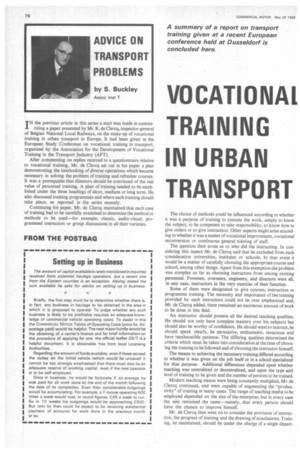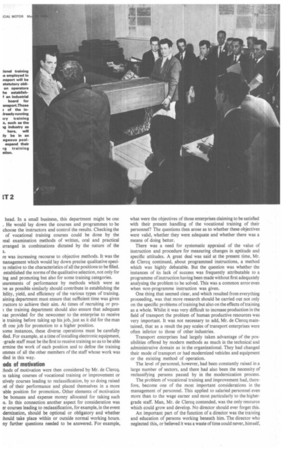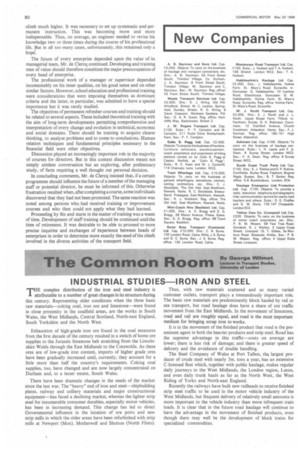VOCATIONAL TRAINING IN URBAN TRANSPORT
Page 80

Page 81

Page 82

If you've noticed an error in this article please click here to report it so we can fix it.
TN the previous article in this series a start was made in summa1 rizing a paper presented by Mr. R. de Clercq, inspector-general of Belgian National Local Railways, on the make-up of vocational training in urban transport in Europe. It had been given at the European Study Conference on vocational training in transport, organized by the Association for the Development of Vocational Training in the Transport Industry (AFT).
After commenting on replies received to a questionnaire relative to vocational training, Mr. de Clercq set out in his paper a plan demonstrating the interlocking of diverse operations which became necessary in solving the problem of training and refresher courses. It was a prerequisite that directors should be convinced of the real value of personnel training. A plan of training needed to be established under the three headings of short, medium or long term. He also discussed training programmes and where such training should take place, as reported in the series recently.
Continuing his paper, Mr. de Clercq maintained that each case of training had to be carefully examined to determine the method or methods to be used—for example, classic, audio-visual, programmed instruction or group discussions in all their varieties. The choice of methods could be influenced according to whether it was a purpose of training to execute the work, simply to know the subject, to be competent to take responsibility, to know how to give orders or to give instruction. Other aspects might arise according to whether it was a matter of vocational improvement, vocational reconversion or continuous general training of staff.
The question then arose as to who did the instructing. In considering this aspect Mr. de Clercq said that he excluded from such consideration universities, institutes or schools. In that event it would be a matter of carefully choosing the appropriate course and school, among other things. Apart from this exemption the problem was complex so far as choosing instructors from among existing personnel. Foremen, overseers, engineers, and directors were all, in any case, instructors in the very exercise of their function.
Some of them were designated to give courses, instruction or programme training. The necessity and importance of the training provided by such instructors could not be over emphasized and, Mr. de Clercq added, there remained an enormous amount of work to be done in this field.
An instructor should possess all the desired teaching qualities. He should not only have complete mastery over his subjects but should also be worthy of confidence. He should want to instruct, he should speak clearly, be persuasive, enthusiastic, tenacious and have inexhaustible patience. The differing qualities determined the criteria which must be taken into consideration at the time of choosing the training to be followed and of choosing the instructor himself.
The means to achieving the necessary training differed according to whether it was given on the job itself or in a school specialized for that purpose. Additional differences depended upon whether teaching was centralized or decentralized, and upon the type and level of training to be given and the number of persons to be trained.
Modern teaching means were being constantly multiplied, Mr. de Clercq continued, and were capable of augmenting the "productivity" of training in many cases. The range of teaching media to be employed depended on the size of the enterprise, but in every case the aim remained the same—namely, that every person should have the chance to improve himself.
Mr. de Clercq then went on to consider the provision of instruction, the progress of training and the drawing of conclusions. Training, he maintained, should be under the charge of a single depart head. In a small business, this department might be one . He would lay down the courses and programmes to be choose the instructors and control the results. Checking the of vocational training courses could be done by the mal examination methods of written, oral and practical trranged in combinations dictated by the nature of the S.
re was increasing recourse to objective methods. It was the nanagement which would lay down precise qualitative speciis relative to the characteristics of all the positions to be filled. established the norms of the qualitative selection, not only for ing and promoting but also for some training categories. isurements of performance by methods which were as [ye as possible similarly should contribute in establishing the bility, yield, and efficiency of the various types of training. aining department must ensure that sufficient time was given Tuctors to achieve their aim. At times of recruiting or prothe training department should also ensure that adequate as provided for the newcomer to the enterprise to receive le training before taking up his job, just as it did for the man ft one job for promotion to a higher position.
some instances, these diverse operations must be carefully For example, at a time of installing electronic equipment, -grade staff must be the first to receive training so as to be able ermine the work of each position and to define the training unmes of all the other members of the staff whose work was oiled in this way.
lods of motivation
Mods of motivation were then considered by Mr. de Clercq. Is taking courses of vocational training or improvement or ttively courses leading to reclassification, by so doing raised Tel of their performance and placed themselves in a more 'able position for promotion.. Other elements of motivation be bonuses and expense money allocated for taking such s. In this connection another aspect for consideration was er courses leading to reclassification, for example, in the event dernization, should be optional or obligatory and whether .hould take place within or outside normal working hours. ny further questions needed to be answered. For example, what were the objectives of those enterprises claiming to be satisfied with their present handling of the vocational training of their personnel? The questions then arose as to whether these objectives were valid, whether they were adequate and whether there was a means of doing better.
There was a need for systematic appraisal of the value of instruction and procedure for measuring changes in aptitude and specific attitudes. A great deal was said at the present time, Mr. de Clercq continued, about programmed instructions, a method which was highly debatable. But the question was whether the instances of its lack of success was frequently attributable to a programme of instruction having been made without first adequately analysing the problem to be solved. This was a common error even when non-programme instruction was given.
One thing that seemed clear, and which resulted from everything proceeding, was that more research should be carried out not only on the specific problems of training but also on the effects of training as a whole. Whilst it was very difficult to increase production in the field of transport the problem of human productive resources was very important. It was not necessary to add, Mr. de Clercq maintained, that as a result the pay scales of transport enterprises were often inferior to those of other industries.
Transport enterprises had largely taken advantage of the possibilities offered by modern methods as much in the technical and administrative domain as in the organizational. They had changed their mode of transport or had modernized vehicles and equipment or the existing method of operation.
The level of personnel, however, had been constantly raised in a large number of sectors, and there had also been the necessity of reclassifying persons passed by in the modernization process.
The problem of vocational training and improvement had, therefore, become one of the most important considerations in the management of personnel. This applied to salaried personnel even more than to the wage earner and most particularly to the higher. gradestaff. Man, Mr. de Clercq contended, was the only resource which could grow and develop. No director should ever forget this.
An important part of the function of a director was the training and education of persons working beneath him. The director who neglected this, or believed it was a waste of time could never, himself,
climb much higher. It was necessary to set up systematic and permanent instruction. This was becoming more and more indispensable. Thus, on average, an engineer needed to revise his knowledge two or three times during the course of his professional life. But in all too many cases, unfortunately, this remained only a hope.
The future of every enterprise depended upon the value of its managerial team, Mr. de Clercq continued. Developing and training men of value should therefore constitute the major preoccupation of every head of enterprise.
The professional work of a manager or supervisor depended incontestably on his inner qualities, on his good sense and on other similar factors. However, school education and professional training were considerations that were imposing themselves as dominant criteria and the latter, in particular, was admitted to have a special importance but it was rarely studied.
The objectives of permanent refresher courses and training should be related to several aspects. These included theoretical training with the aim of long-term developments permitting comprehension and interpretation of every change and evolution in technical, economic and social domains. There should be training to acquire clearer thinking, to analyse problems and to come to conclusions. Human relation techniques and fundamental principles necessary in the financial field were other objectives.
Discussion played an increasingly important role in the majority of courses for directors. But in this context discussion meant not simply aimless conversation but an exploring, after preliminary study, of facts requiring a well thought out personal decision.
In concluding comments, Mr. de Clercq insisted that, if a certain programme should influence the future of a member of the managing staff or potential director, he must be informed of this. Otherwise frustration resulted when, after completing a course, some individuals discovered that they had not been promoted. The same reaction was noted among persons who had received training or improvement courses and who then could not apply what they had learned.
Proceeding by fits and starts in the matter of training was a waste of time. Development of staff training should be continued until the time of retirement. It was desirable to be able to proceed to more precise inquiries and exchanges of experience between heads of enterprises in order to determine more exactly the need of the chiefs involved in the diverse activities of the transport field.




























































































































